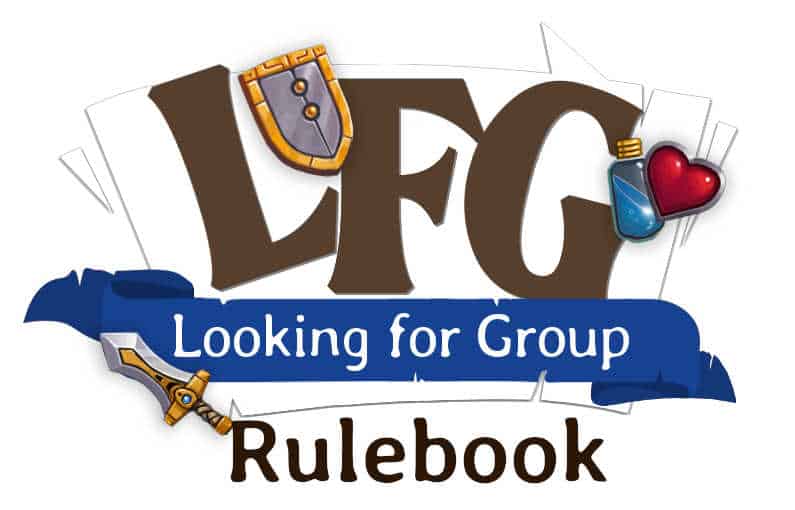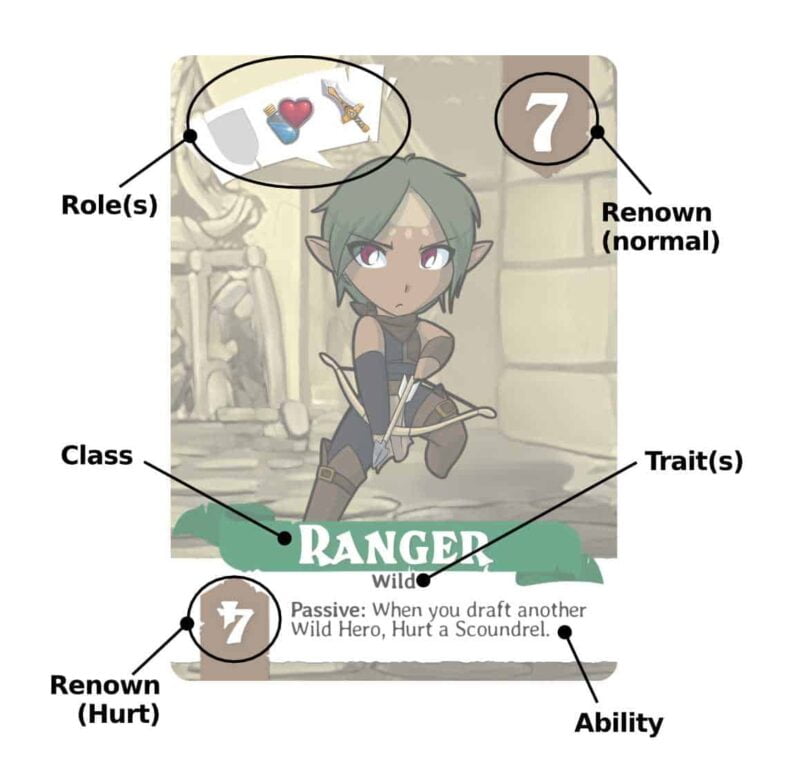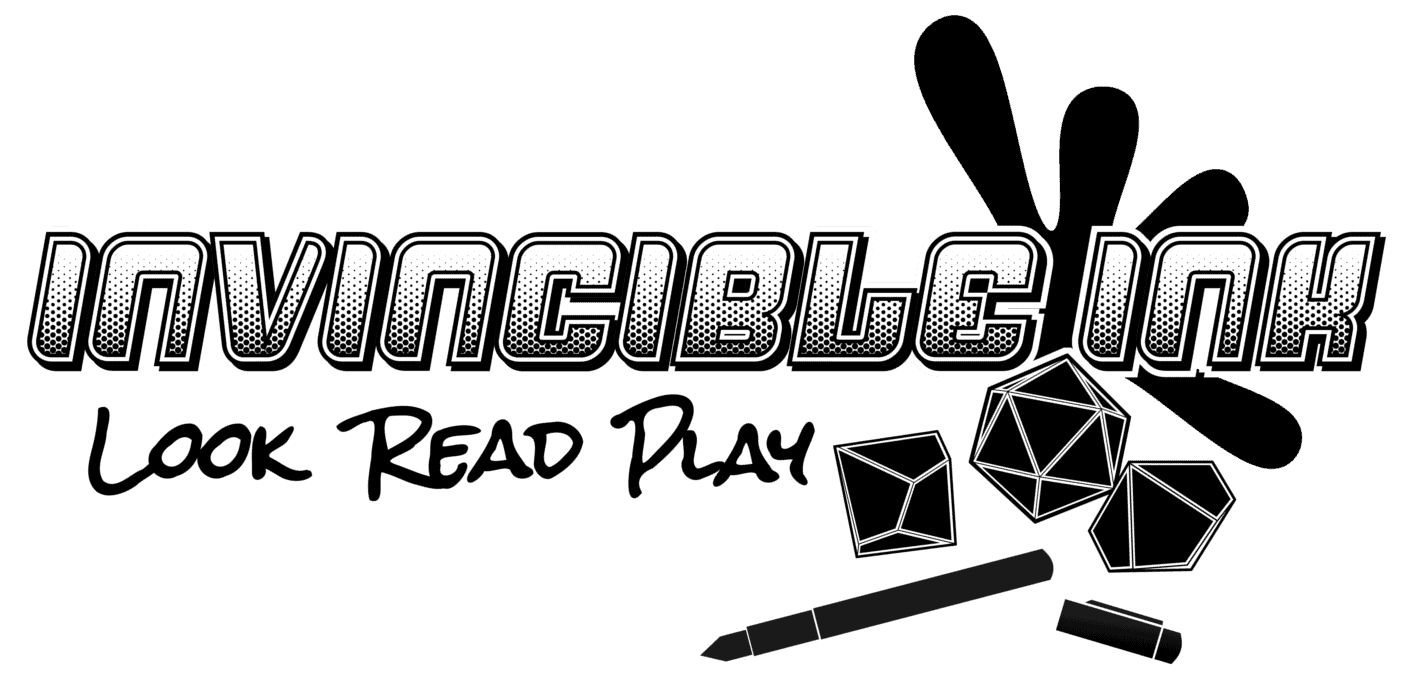
Introduction
In a world of swords and sorcery, everybody wants to quest for fame and glory! But before you can get to the glamorous part, it’s time for some good old-fashioned HR.
In LFG: Looking For Group, you’re trying to build an adventuring party by gathering heroes with different aptitudes and convincing them to work together! Or, you could just recruit all the shadiest scoundrels in the land.
LFG is a game of drafting; choosing resources turn by turn. Each round, you will choose one Hero from your hand to join your party. Then, you’ll pass your hand to the next player.
However, Heroes can use their abilities to mess with rival parties. Using them wisely will make the difference between assembling a winning team, and a dysfunctional mess!
Components
LFG contains 46 Hero cards (two copies each of 23 different Heroes).
Access
LFG can be played by 2-7 players, but some rules change if you have only 2 players, or more than 4 players.
Each player will need to read the cards in their hand without showing other players. They also need room to lay out their chosen cards, where all the players can see them.
The game requires some basic addition and number comparison. However, you won’t need to track any game information apart from what’s on the cards. The cards only need to be shuffled once per game.
As always, remember to respect the players and their needs.
Play Basics
LFG can be played by large or small groups, but the simplest version of the game assumes you have 3-4 players. If you want to play with 2 players or 5-7 players, check for additional play rules at the end of this rulebook.
Setup (3-4 players)
First, remove the second copy of each hero from the deck, leaving 23 unique cards. Shuffle the deck and deal each player five cards.
Deal a further three into the centre of the play area, face-up. This is the Graveyard. If a hero is killed during the game, it is also placed here.
If there are any cards remaining, set them aside. They will not be used during this game.
Turn Structure
Each round, you look at the Heroes in your hand and choose one to Draft. Take that card and place it face-down in front of you. That hero is now in your Party.
Once every player has drafted a hero, you turn them all face up together. On most turns, several of the drafted heroes will have special Abilities that activate now. Heroes in your party might also have abilities which are activated by drafting.
Resolve any hero abilities which have been activated this round, then pass your hand to the next player around the table.
Note which Roles your heroes can fill – you need at least one Defence, one Support and one Damage hero to complete your party.
Play continues until all heroes have been drafted. Then, the player with the most successful Final Party wins!
Heroes
Below is an example of a hero card, showing the different characteristics each hero can have.

Class
Each hero has a unique Class name. Your party can contain multiple heroes of any class.
Roles
Heroes have different areas of expertise. To build a successful party, you must cover your bases by filling all three Roles with at least one hero.
There are three roles: Defence (represented by the shield icon), Support (potion icon) and Damage (sword icon). If a hero is suited to a particular role, that icon is shown on her card.
A hero can be suited to more than one role, but she can only fill one role at a time. The versatile bard can play any role, but she can’t be a whole party on her own!
If your final party can’t fill all three roles, it is incomplete and you can’t win the game.
Renown
The hero’s Renown indicates how valuable she is to an adventuring party. At the end of the game, the party with the highest renown score wins the game! (Usually—watch out for Scoundrels!)
If two players are tied for the highest renown, they both win the game.
Renown (Hurt)
During the game, a hero can be Hurt by certain effects. When this happens, turn them upside-down and use this renown value in place of their normal renown value.
Usually, a hero’s reputation is tarnished when she is hurt, lowering her renown. However, some heroes look even better under pressure—their renown will actually go up!
Traits
Traits are special qualities that appear on certain heroes—for example, being especially loyal to her party, or being a disreputable scoundrel. These traits have varying effects in game, outlined below:
- Loyal: The hero is a noble individual who will never abandon her party. Loyal heroes cannot be targeted by Recruit abilities.
- Spellcaster: The hero wields some sort of of magic. Spellcasters have powerful abilities, but they can be targeted by powerful abilities too.
- Wild: The hero has a primal, nature-loving spirit. Wild characters are especially good at working together.
- Scoundrel: The hero is a shady character who can cheat more reputable parties out of their rightful winnings. Scoundrels offer an alternate way to win the game, but only if you gather more of them than anybody else. They are dangerous, but unreliable!
Traits apply to a hero at all times, regardless of where their card is: in a player’s hand, in a party, or even in the graveyard.
Abilities
Each hero has a special Ability. This text tells you what the hero’s ability is, and when it gets used.
Draft Abilities
Heroes with “Draft:” abilities use them immediately when (and only when) they are drafted. Such abilities only activate when the character is drafted.
If a character gets into a party without being drafted—for example, if she is recruited or swapped into the party—then her draft ability does not activate.
Passive Abilities
If a hero in your party has a “Passive:” ability, they benefit from its effect as long as they are in your party. When a hero is not in a party, their passive ability has no effect.
Many passive abilities trigger a benefit when you draft another hero. If your draft pick for the round meets the conditions specified by the ability, that ability activates along with any Draft Abilities that activate this turn.
If a passive ability allows you to perform an action but does not specify when, you can do the action whenever you want.
If the passive ability has no activation condition, it is always in effect. Priority does not apply to such an ability.
Effects & Priority
When abilities activate, they resolve in a specific order, based on effect. First, determine all abilities that activate in a round. Then, resolve them in the order given below.
If an additional ability is activated during this process, simply add it to the remaining abilities waiting to be resolved. If the new ability has a priority higher than any remaining abilities, resolve it immediately.
- Extra draft: Some abilities let you draft an extra hero this round, If your second pick has a draft ability, it will also activate this round.
- Copy: When you copy the draft ability of another hero, you activate the chosen ability this round at its normal priority. The ability does not grant any other characteristics of the copied hero.
- Protect: Protected heroes are immune to Hurt and Kill effects. These abilities also can’t target a protected hero.
- Hurt: When a hero gets hurt, they use their hurt renown value instead of their normal renown value. Nothing else on the card is affected.
Hurting a hero who is already hurt has no effect. (Most heroes aren’t looking to kill anybody over a job opportunity.) However, you can still target them with a hurt ability if you wish. - Heal: Healing a hurt hero lets her go back to using her normal renown value. Healing a hero who isn’t hurt has no effect, though you can still target them with a heal ability if you wish.
- Recruit/Swap: These abilities let you take a hero from somewhere other than your hand (usually, from somebody else’s party). The hero you take does not count as being drafted, and her hurt status does not change.Remember, you can never target a Loyal character with a recruit ability.
- Kill: When you kill a hero, she is now dead. Take her from whatever party she is in, and put her into the graveyard. Dead heroes cannot be healed.
Other Ability Notes
Abilities are not optional
Heroes have their own ideas about how to best get things done. Most abilities activate automatically, based on certain conditions. If the text says that their ability happens, it happens—whether or not you want it to.
However, if the ability says you “can” or “may” do something, you can choose whether or not you want to use the ability.
Abilities with Targets
If an ability requires you to choose one or more heroes to be affected by it, then that ability has a Target. Resolving this ability requires some additional rules.
- Choose during resolution: Don’t choose a target until it’s time for the ability to resolve. Effects which have priority over yours can change your available targets.
- Heroes in parties only (usually): Unless the ability specifies a target outside of a party—for example, in your hand or in the graveyward—you can only target heroes currently in a party.
- You must choose if you can: If there is at least one valid target in play, then you must choose one. If the ability has multiple targets, you must choose as many of those targets as you are able.
- Friendly fire: You can be forced to choose a target you don’t want (for example, hurting a hero in your own party) if there are no other targets.
- No targets: If (and only if) there are no valid targets for an ability, you don’t have to choose. The ability just does nothing.
Conflicting Priority
Sometimes, multiple abilities can activate with the same priority, especially if you are playing with the full hero deck. When that happens, use these rules.
- Same player: If the effects are all controlled by the same player, that player can choose the order in which they resolve.
- Different players: If the effects are controlled by different players, check the current renown of each player’s party (including this round’s draft pick). A player with higher renown can choose whether they want their ability to resolve before or after a player with lower renown.
- Equal renown: If renown scores are equal, determine a player at random.
Winning
Once all the heroes have been drafted, the game ends. Any player without a complete final party is disqualified. Then, the party with the highest renown wins the game!
Unless…
Scoundrel Win
If you complete your final party with more scoundrels than any other player, AND your party has the lowest renown, you win the game. (Note that if either your number of scoundrels or your renown score is tied with another player, it doesnt count.)
Alternate Play
This section contains rules for playing with two players, playing with larger groups, and customising the game to your tastes.
Custom Deck
Firstly, your group can alter the game to your tastes by removing heroes you don’t enjoy playing. For example, if you want a no-death game, simply remove the Assassin and the Witch Hunter. Conversely, you could also add in the second copy of a hero everybody likes.
When the deck is altered, the game stays mostly balanced, as players still compete for the strongest heroes. However, try not to penalise any strategy too hard unless you want to remove it entirely. For example, if you only leave two scoundrel cards in the deck, a scoundrel win becomes impossible—so make sure everybody realises that before you play!
Large Groups
For groups larger than 4 players, start play with the entire deck (instead of removing all duplicates). You still deal only 5 cards to each player, and 3 to the graveyard.
Alternatively, you might choose to deal fewer cards to each player’s starting hand. This will make for a very short, very tight game, so make sure that’s what you prefer!
A Little Chaos
Even for a small group, you could choose to play with the entire deck instead of removing the second copy of each hero. However, this will make the game less predictable (since now each hero might show up once, twice, or not at all.)
Two Player Mode
If you only have two players, passing your hand to the next player each turn becomes much less exciting. Try these alternate rules if you want a more engaging two-player mode.
Shuffle up one copy of each hero, and deal out three separate piles of one card each. You will have to take turns in this game mode, so randomly select a player to go first.
On your turn, begin by looking at the cards in the first pile. Then, choose one:
- Take the pile: Put all the cards from the pile into your hand, keeping them in the same order. Then, deal one card from the deck into the now-empty pile. Your turn then ends.
- Leave the pile: Put the cards back, keeping them in the same order, and deal one card from the deck onto the top of the pile. Then, the repeat the look-and-choose process for the next pile.
Once all the cards have been drafted, it’s time to build parties. In the same order they were drafted, each player puts one hero per round into their party. The hero you reveal is your draft pick for the round.
- In this mode, hero abilities still activate according to the normal drafting rules.
- If an ability tells you to draft an extra hero, immediately reveal the next card in your hand too.
- If an ability tells you to skip your next draft pick, don’t add a hero to your party during the next round.
- If you run out of heroes early, simply wait for your opponent to play out the remaining rounds.
- Normal rules for winning and losing the game still apply.
Credits
Development & Design: Talen Lee
Card Design & Illustration: Fox Lee
Documentation: Fox & Talen Lee
Special Thanks: Rachel
Resources: Shaman’s Stockart
